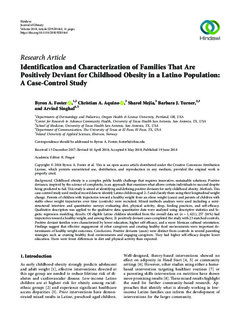Identification and Characterization of Families That Are Positively Deviant for Childhood Obesity in a Latino Population: A Case-Control Study
Peer reviewed, Journal article
Published version
Permanent lenke
http://hdl.handle.net/11250/2591725Utgivelsesdato
2018Metadata
Vis full innførselSamlinger
Sammendrag
Childhood obesity is a complex public health challenge that requires innovative, sustainable solutions. Positive deviance, inspired by the science of complexity, is an approach that examines what allows certain individuals to succeed despite being predicted to fail. This study is aimed at identifying and defining positive deviants for early childhood obesity. Methods. This case-control study used medical record data to identify Latino children aged 2–5 and classify them using their longitudinal weight change. Parents of children with trajectories toward a healthy weight from an obese weight (cases) and parents of children with stable obese weight trajectories over time (controls) were recruited. Mixed-methods analyses were used including a semi- structured interview and quantitative surveys evaluating diet, physical activity, sleep, feeding practices, and self-efficacy. Qualitative description was applied to the qualitative data; quantitative data were analyzed using descriptive statistics and lo- gistic regression modeling. Results. Of eligible Latino children identified from the overall data set (n � 1, 621), 257 (16%) had trajectories toward a healthy weight, and among these, 21 positively deviant cases completed the study with 23 matched controls. Positive deviant families were characterized by lower education, higher self-efficacy, and a more Mexican cultural orientation. Findings suggest that effective engagement of other caregivers and creating healthy food environments were important de- terminants of healthy weight outcomes. Conclusions. Positive deviants (cases) were distinct from controls in several parenting strategies such as creating healthy food environments and engaging caregivers. They had higher self-efficacy despite lower education. There were fewer differences in diet and physical activity than expected. Identification and Characterization of Families That Are Positively Deviant for Childhood Obesity in a Latino Population: A Case-Control Study
